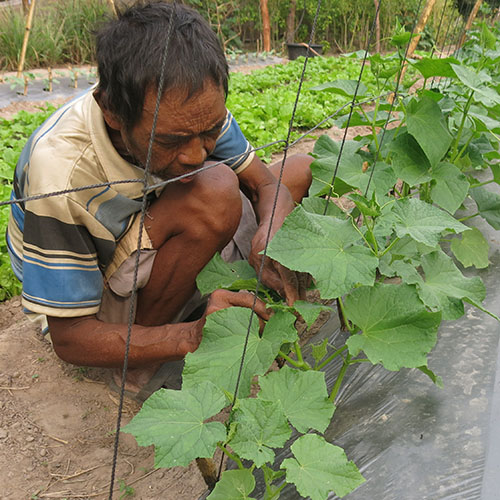Stories of Change

Sim growing vegetables using a drip technique. Photo: CWS
Seeds, tools, training and initiative: a recipe for success!
Chann Sim, 61, lives with his wife Ek Mon, 55, and their three children in Choam Ksant village in northern Cambodia. Sim owns a third of an acre of land for the family’s house and home gardening and another 2.5 acres where Sim plants rice. He can only plant once a year because of chronic drought. In the past, he used traditional, labor intensive methods and poor local seedlings that, unfortunately, did not produce enough food for his family.
Often the rice harvested would only last six months. In order to make up for the food shortage, Sim would go to the forest to collect wild fruit, mushrooms, bamboo shoots and wild cassava. This was incredibly risky, though, because there are still lingering landmines in the forest from decades ago. To meet his family’s food needs, Sim would also earn extra income as a wage laborer planting others’ cassava.
Some years ago, when CWS had the opportunity to partner with families in his village, Sim joined the food security project as a Household Partner. He received some vegetable seeds and farming tools . He also gained valuable knowledge and training on how to grow vegetables in the face of changing climates and about chicken- and catfish-raising and mushroom growing.
Through the years, Sim has taken the initiative to learn how to improve his farm. Using his new knowledge and changed farming practice, and with material help from CWS, Sim has turned his family’s life around. In addition to fish and poultry, Sim has expanded his home garden to include several kinds of gourds, chili, eggplant, long bean, papaya, cucumber and banana. Now, with help from his wife and grown daughters, he earns just a bit more than $1,000 in a year, and he has enough to feed his family from his own farm.
Sim is now sharing his knowledge and experiences related to farming management with others in his village. He recently said, “I am so thankful to CWS for the support; I have gained new knowledge and skills in diversified agriculture and I have been able to increase my production. I am confident to work on my farm; and I am glad I do not have to sell my labor. Ownership is better than working for others for a daily wage!”
